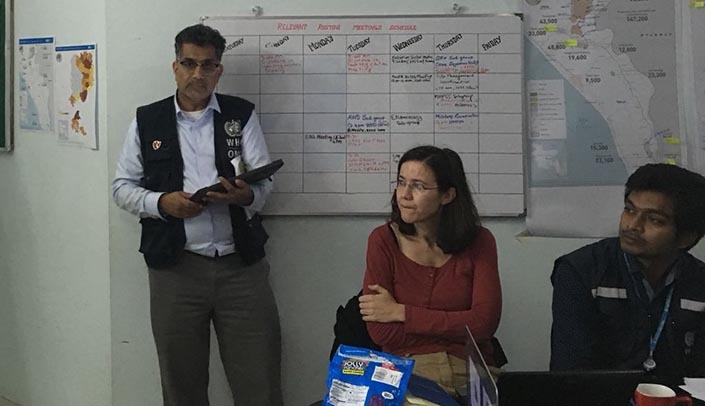Ali S. Khan, M.D., M.P.H., dean of the College of Public Health, is spending his holiday in the Rohingya refugee camp in Cox’s Bazar, Bangladesh, to help fight an outbreak of diphtheria. He expects to return in late January. Jane Meza, Ph.D., senior associate dean, will be acting dean in the interim.
Dr. Khan was deployed at the request of the World Health Organization (WHO). UNMC is a member of the Global Outbreak Alert and Response Network (GOARN), a source of expert consultants for United Nations’ (UN) agencies.
He is leading efforts to support the international partners and host government to use data for improving health of the Rohingya and surrounding localities. His team will establish an early warning and alert reporting system and diphtheria monitoring in health facilities and communities.
Since August, more than 646,000 people from Myanmar’s Muslim Rohingya minority have fled to Bangladesh after escaping a military crackdown that included horrendous atrocities amounting to ethnic cleansing.
They have gathered in densely populated camps and temporary settlements with poor access to clean water, sanitation and health services. A multi-agency diphtheria task force, led by the Ministry of Health Family Welfare of Bangladesh and supported by the UN and numerous international organizations, has been providing clinical and public health services to the displaced population.
An ongoing diphtheria outbreak among the refugees has claimed 30 lives and caused approximately 3,000 cases. Thanks to readily available vaccines, diphtheria outbreaks are a rarity in modern times except in exceptional conditions of catastrophic public failure — often in the setting of war or political malevolence and incompetence, Dr. Khan said.
Diphtheria is a serious bacterial infection that affects the mucous membranes of the throat and nose. If left untreated, the illness can cause severe damage to the kidneys, nervous system and heart – and it can be fatal.
The chronically persecuted population of the Rohingya is at high risk of numerous communicable diseases and outbreaks in their current conditions including cholera, typhoid, Shigella virus, measles, tetanus, pertussis, rabies, Nipah virus, malaria, chikungunya, Zika virus and dengue.
Since joining UNMC, Dr. Khan was twice deployed by GOARN to Sierra Leone in 2015 to help eradicate the Ebola virus in that country.
